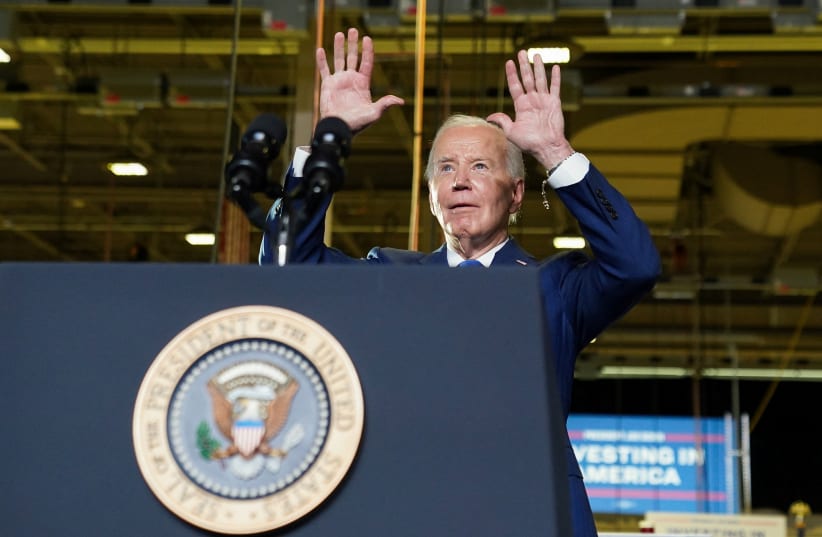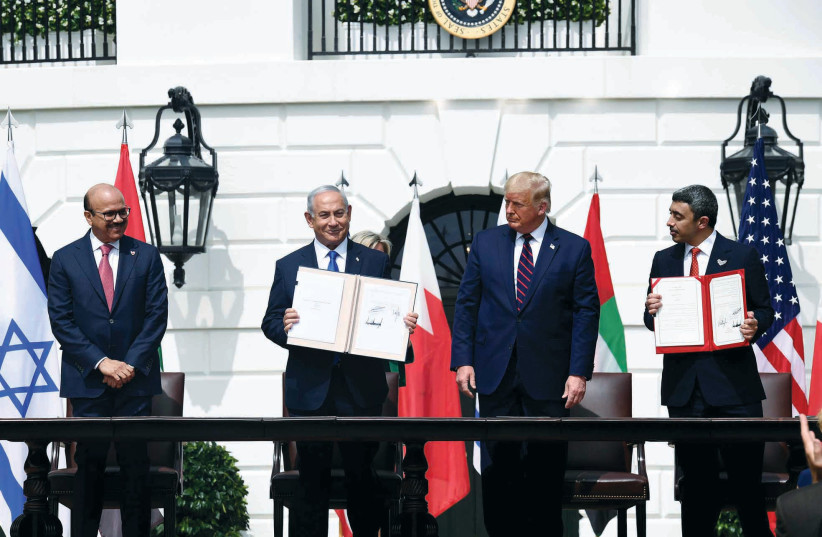“The worst crisis in decades” scream the pundits as President Biden blocks delivery of crucial weapons to Israel in order to stop the push into Rafah. Moreover, if Israel goes forward over the American objections, Biden threatened to freeze other “offensive weapons.” The ostensible reason is concern over civilian casualties and images of hunger (even starvation) expected from a full-scale Israeli attack and siege of southern Gaza.
On CNN, Biden declared “I’ve made it clear to Bibi and the war cabinet: They’re not going to get our support if they go [into] these population centers.”
Many Israelis, and not only Netanyahu and his supporters, as well as American politicians and Jewish leaders, denounced Biden for going back on his emphatic pledges to do everything necessary to help Israel defend itself, defeat Hamas and return the hostages. House Speaker Johnson and Senate Minority Leader McConnell condemned the policy that “flies in the face of assurances provided regarding the timely delivery of security assistance to Israel” and “call[s] into question your pledge that your commitment to Israel’s security will remain ironclad.”
Did Biden get spooked?
Did Biden suddenly do a 180 degree flip, and if so, why? Were the humanitarian concerns for the innocents in Gaza (as well as the many Hamas supporters who cheered the brutal October 7 slaughter and rape) the reason, as indicated by Secretary of Defense Austin? Or was Team Biden spooked by the campus mobs into caving-in to their demands?
Most likely, the correct answer is “none of the above.” A look at the details suggests a carefully planned strategy, under the heading of a Grand Bargain for the Middle East. This dream scenario has been in the background (and at times, foreground) of Administration policies for months. The essential elements include “irrevocable commitment” to Palestinian statehood and “end of conflict;” large-scale Israeli withdrawal on the West Bank, and a formal Saudi-Israeli peace agreement echoing the Abraham Accords.
In other words, Biden and Secretary of State Blinken are aiming for the diplomatic equivalent of a moon shot, the Nobel Peace Prize, and, not incidentally, victory in the November elections. The script for redrawing the map was written by Tom Friedman, the veteran New York Times columnist who has been promoting versions of this for decades.
And it begins in Rafah, through orchestrating a stalemate and ceasefire that prevents Israel from totally defeating and uprooting Hamas as the dominant Palestinian terror organization and the rulers of Gaza.
The problem (and it is a very big one) is that the entire scenario is built on a foundation of wishful thinking, not history and political realism. Similarly, the triumphant 1993 Oslo “peace” plan was based on the same illusions, and ended in the disaster known as the Second Intifada, in which over 1000 Israelis were murdered in mass bombings, and thousands more died on the Palestinian side. It turned out that Yasser Arafat and the PLO, as well as Hamas leaders never bought into the “shared interests” that were taken for granted by the optimistic Israelis and the Clinton administration.
For Hamas, the freezing of weapons deliveries, the wider conflict between Washington and Jerusalem, and demands for a ceasefire on their terms are a huge gift, including continuing to use every last brutalized Israeli hostage to squeeze out more concessions. Their propagandists, including the campus groups, interpret the Biden freeze as a great victory, encouraging these activists to continue and escalate the campaign of chaos and hate.
Watching closely, Iran and its proxies also see these developments as weakening the IDF’s capability to use its military superiority offensively. And as long as Hezbollah’s terror squads remain in southern Lebanon, the 50,000 or so Israeli civilians that were evacuated from their homes after October 7 will continue to be “displaced.” In Tehran, regime leaders draw strength from the very visible American constraints placed on Israel, including after the Iranian missile attack on the night of April 13. Thus, instead of encouraging restraint and cooperation, as the dream scenario envisions, greater instability and violence are far more likely. As with Oslo, when this happens, Biden, Blinken and the others will be gone.
Most Israelis understand the massive gap between optimistic dream scenarios and political realism. With one notable exception, every Israel territorial withdrawal - West Bank cities in 1994; southern Lebanon in 2000; and Gaza in 2005 - has ended with mass terror and slaughter. The exception is the 1979 peace between Israel’s Menachem Begin and Egypt’s Sadat, based on the “land for peace” tradeoff that has held fast for 45 years. But unlike Hamas or most of the “moderates” headed by Mahmoud Abbas, Sadat’s objectives ended with the return of the territory lost in the 1967 war.
Israelis, including Netanyahu’s most vocal critics, know that withholding munitions to prevent the IDF from entering Rafah and recognizing a virtual Palestinian state will not end 76 years of Palestinian rejectionism. More likely, the determination to attack Israel will increase, accompanied by Iranian support. The addition of a Saudi-Israeli peace package will not change this reality.
For all these reasons, successful diplomacy must be based on realism, in contrast to wishful thinking and illusions of a “grand bargain.” Peace between Israel and the Palestinians will only come when the expectations overlap with political realism. Until then, Israel, under Netanyahu and whoever comes next, will do what is necessary to defend its citizens.
Gerald M. Steinberg is emeritus professor of politics at Bar Ilan University, president of NGO Monitor, and author (with Ziv Rubinovitz) of Menachem Begin and the Israel-Egypt Peace Process: Between Ideology and Political Realism

